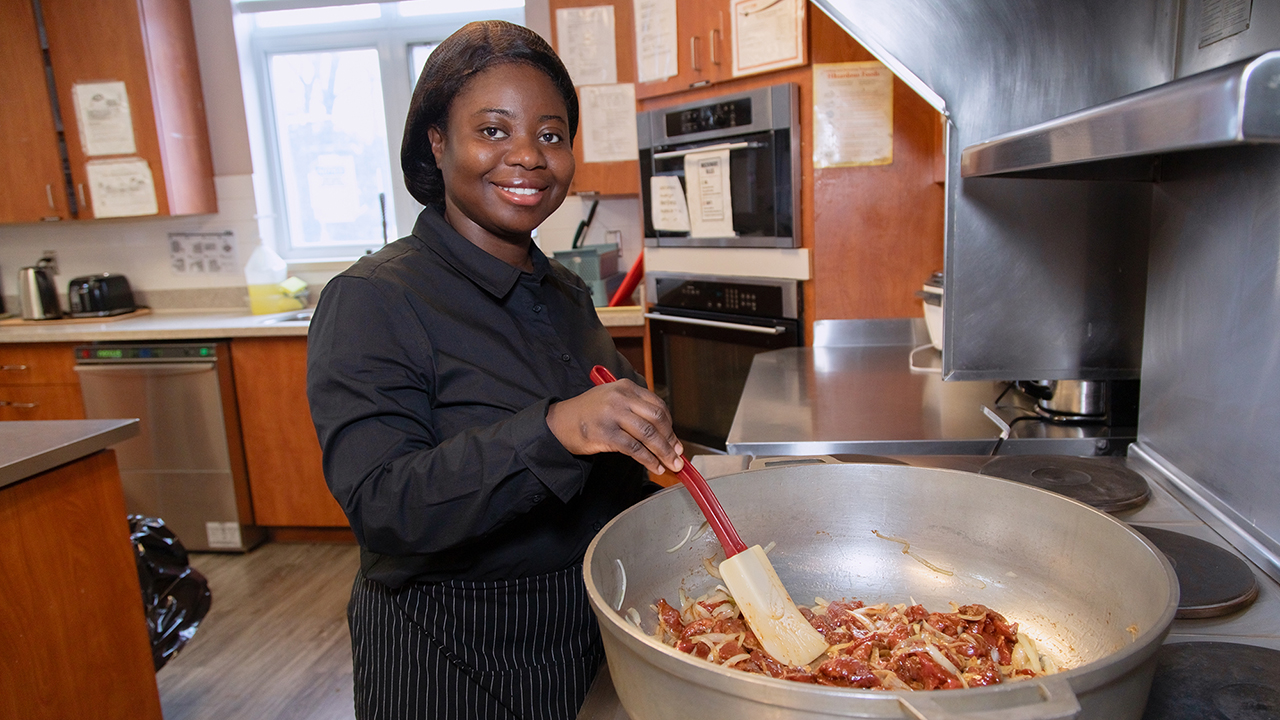
After experiencing gender-based violence, a United Way-funded agency helped Francisca find safety and family
Francisca hopes that every meal she cooks brings someone a small moment of joy or relief.
She’s a Food and Nutrition Worker at Embrave Agency Against Violence, one of almost 30 United Way-funded organization addressing gender-based violence in the GTA. As a survivor herself, she understands what it’s like to arrive at a shelter, unsure of what’s next. Providing them with a delicious meal prepared by someone who cares is one way to make the transition easier.
“When I’m cooking, I have them at heart and I have them in my mind,” she says. “I have been here before, so I have to do it right—make it so good so they can also enjoy it, just to put a smile on their face.”
Not too long ago, Francisca had come to Embrave herself, seeking emergency shelter from her abuser, her son’s father. When she got pregnant, the family she had in the GTA refused to help her, leaving her to move in with her boyfriend. He financially, emotionally and physically abused her, starting when she was pregnant and continuing after she gave birth to their son. Francisca tried to leave him many times, but she returned because she had nowhere else to go. Then she called Embrave.
“They were very supportive. I started living at the shelter, and since then my life changed,” she says.
Survivors of gender-based violence may need a wide range of supports to help them get through crisis, remain out of harm’s way and build a new life. That’s why United Way invests in programs that meet them where they’re at—and more than 47,000 survivors have received this support to live free from violence or to reduce the risk of violence—providing everything from emergency shelter and counselling to employment supports and financial and legal services.
That range of support meant the world to Francisca. She and her son stayed at the shelter for five months before moving to the agency’s transitional housing program, where they lived for a year, during which time she accessed food and clothing banks, employment supports, housing referrals and more. The organization also helped her build up her confidence and start thinking about what she wanted for her future.
“It made me want to get up on my feet. I felt empowered, that I can also make a positive impact in my society,” she says. “All the things that I received from the community, all the things that I received from Embrave and United Way, I also want to give back.”
Francisca always enjoyed cooking, but she came to truly love it during her time at the shelter, where she learned from the agency’s Food and Nutrition Worker. Deciding that was her way forward, she attended college and graduated with a culinary management diploma having made the Dean’s List each semester.
When the position for Food and Nutrition Worker became available at the shelter, Francisca applied and got the job. Today, she’s helping others who are going through some of the same challenges she faced, which gives her work additional meaning.
“It gives me that feeling I felt when I started living at the shelter,” she says. “You feel safe, and you feel like there are a whole lot of people around you that are also in the same position as you are. It makes me feel like I’m a part of it more. I appreciate it more.”
Francisca’s journey has not been linear. It took many attempts for her to leave her abuser for good, which is not uncommon for survivors. She recognizes now that every time she would start to move forward and build herself up, her abuser would come back into her life and try to pull her down. But from the first day she stepped through Embrave’s doors, she felt as though she was part of a family, instantly connected to the people with shared experiences and the staff who support them. Francisca continued to feel that connection and support even after leaving the shelter, something she is incredibly grateful for.
“I’m a strong woman now, but before I couldn’t even talk for one minute. I was very timid, because of the things that I went through. It had got to a point that I felt like when I’d walk, I didn’t see myself, I didn’t feel like myself,” she says.
“This program really has really impacted my life, and I’m so happy, so fortunate, because they treat us as family.”